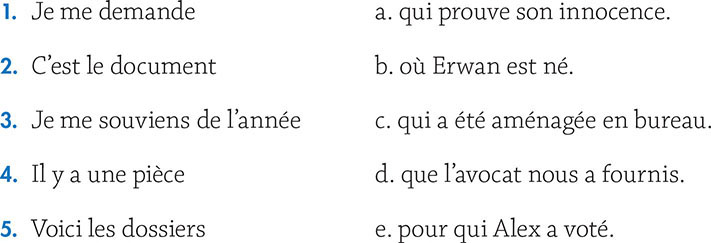13 The Subjunctive Mood and Relative Pronouns
The subjunctive is not a tense, but a mood. And as you’ll learn in this chapter, there are three conditions that warrant the subjunctive: emotions, desires, and doubts.
The Subjonctif Présent
Whether you know it or not, you have previously studied moods: the indicative mood (le passé composé, l’imparfait, le futur, etc.), the imperative mood, and the conditional mood. Another mood, the subjunctive refers to someone’s opinion or deals with a hypothetical action.
For regular verbs, the present of the subjunctive is formed by adding the subjunctive endings (-e, -es, -e, -ions, -iez, -ent) to the stem. And the stem for je, tu, il, elle, on, ils, and elles is formed by dropping the -ent ending from the third-person plural of the present tense. Note that the sound of the verb for these pronouns will remain the same, and that for irregular verbs the nous and vous forms of the verb are identical to those of the imperfect.
Regular Verbs in the Subjonctif Présent
Let’s look at the the verb écouter (to listen):
■ The third-person plural: ils écoutent
■ The stem: écout-

Now let’s conjugate the verb lire (to read) in the present subjunctive:
■ The third-person plural: ils lisent
■ The stem: lis-

And finally, let’s conjugate attendre (to wait) in the subjonctif présent:
■ The third-person plural: ils attendent
■ The stem: attend-

Irregular Verbs in the Subjonctif Présent
Être and avoir have irregular stems and endings for the subjunctive.


There are three verbs that have an irregular subjunctive stem but regular endings:

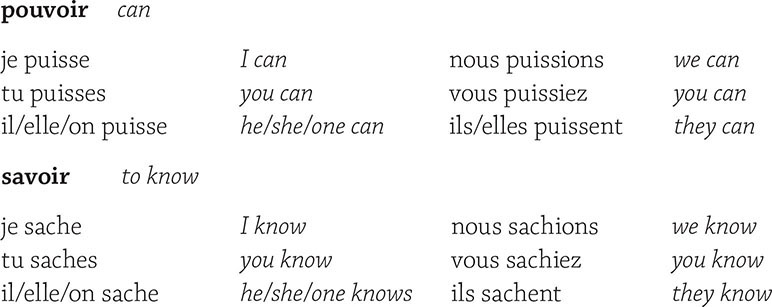
The verbs aller and vouloir have irregular stems and regular endings.
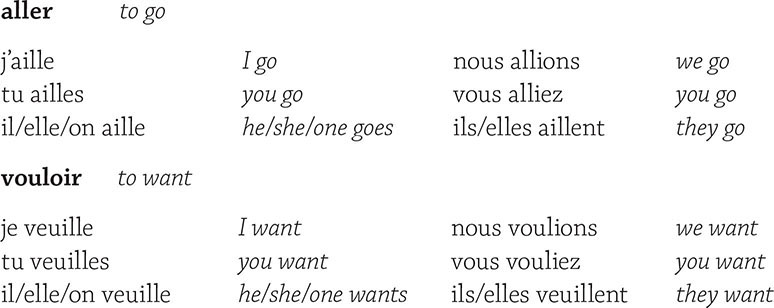
Uses of the Subjunctive
There are three main concepts that use the subjunctive: emotions, wishes, and doubts. Most importantly, the subjunctive is used when the subject of the main clause and the subject of the dependent clause are different.
Compare the following sets of sentences:


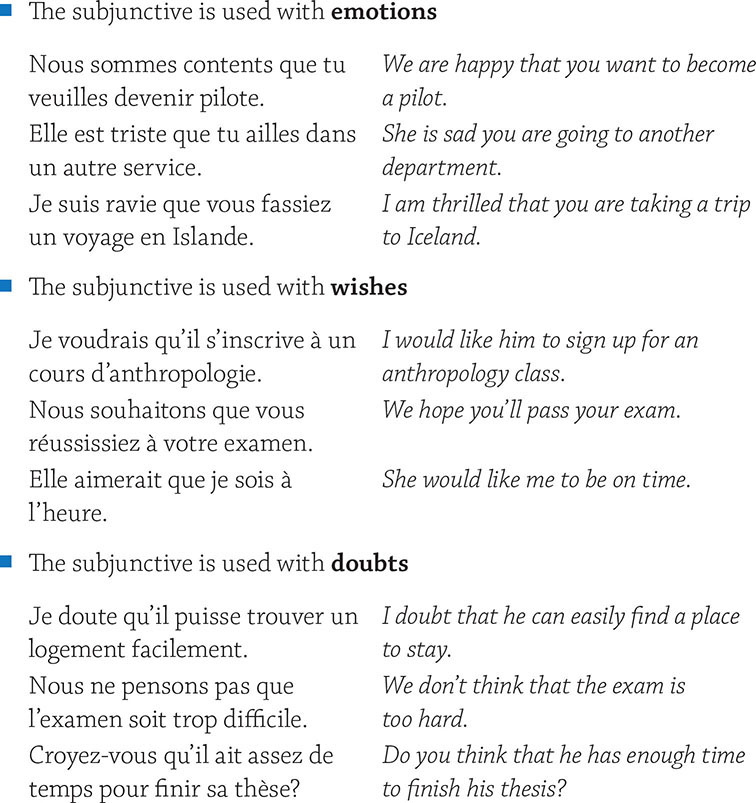
When the verbs penser (to think) and croire (to believe) are used in the affirmative, they are followed by the indicative mood. On the other hand, when they are used in the negative or interrogative, the subjunctive can be used to emphasize uncertainty.

This sentence implies that the speaker is sure that Monsieur Hulot is guilty.

But here, because the subjunctive is used, the speaker is somewhat doubtful about Monsieur Hulot’s innocence.
Conjunctions Using the Subjunctive
In Chapter 10, we saw that many conjunctions like quand and pendant que are followed by the indicative mood. As you can infer from the title of this section, there are other conjunctions that are followed by the subjunctive mood. Let’s take a look at a few of them.
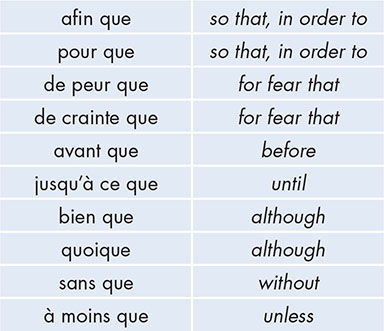

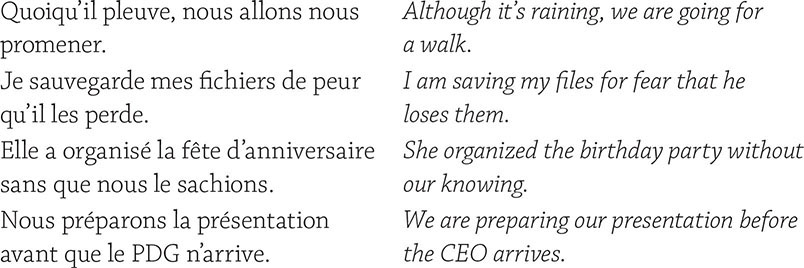
The Conjunction Pourvu que
Pourvu que means provided that.

When used in a single clause, pourvu que takes on a different meaning: let’s hope. This usage of pourvu que expresses hopes and desires—and when you use it, people will delight in your mastery of the subjunctive.

The Subjunctive with Impersonal Expressions
Some impersonal expressions are used with the indicative mood, while others are followed by the subjunctive. Here are some impersonal expressions followed by the indicative:
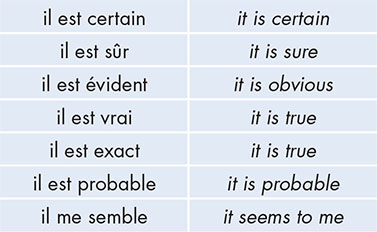

Here are some impersonal expressions followed by the subjunctive:
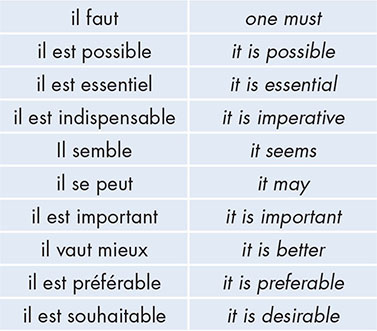
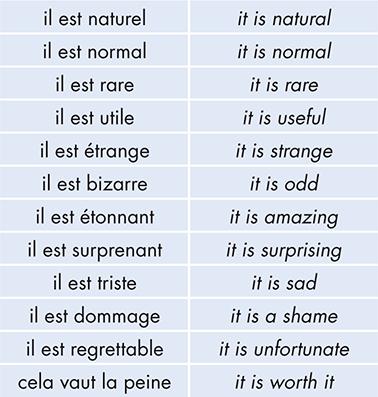

Let’s compare the following sentences, one in the indicative, the other in the subjunctive:

The Subjunctive and the Superlative
The subjunctive is also used after a superlative, or an adjective that conveys a superlative idea such as premier (first), dernier (last), seul (only), and unique (unique).

The Subjunctive and Uncertain Existence or Outcome
The relative pronouns qui and que can sometimes be followed by the subjunctive. If there is doubt about the existence of someone or something, or about the possible realization of something, the subjunctive may precede the relative pronoun.

The Past Subjunctive
The past subjunctive follows the same principles as the present subjunctive; however, the action of the independent clause is anterior to the action of the main clause. To form the past subjunctive, use the present subjunctive of être or avoir with the past participle.
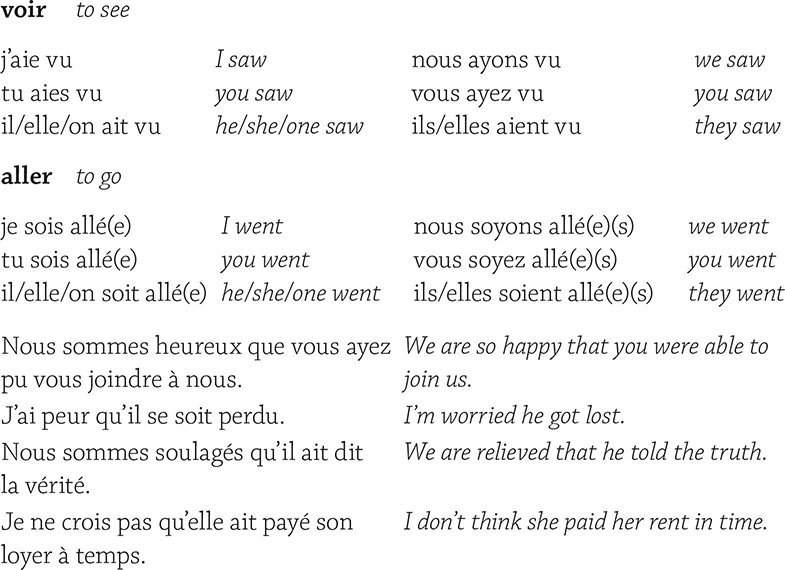
Whatever, Whoever, Wherever
The present of the subjunctive is used with the indefinite expressions whatever, wherever, and whoever. When whatever is followed by a verb, the neutral quoi que is used.

When whatever is followed by a noun, quel que is used. Quel que agrees in gender and number with the subject.

To express wherever, use où que plus the subjunctive:

The subjunctive is also used to express whoever. For example:

Avoir beau
The expression avoir beau can be translated as although or however much. You cannot understand a conversation or a film and you cannot read a newspaper or a 19th- or 21st-century novel without mastering avoir beau. Although its origin goes back to the Middle Ages, it is used every day in oral or written French. It may express a reservation about an idea, a contradiction, a concession, or a difficulty.

Avoir beau can be used in the past and the future:
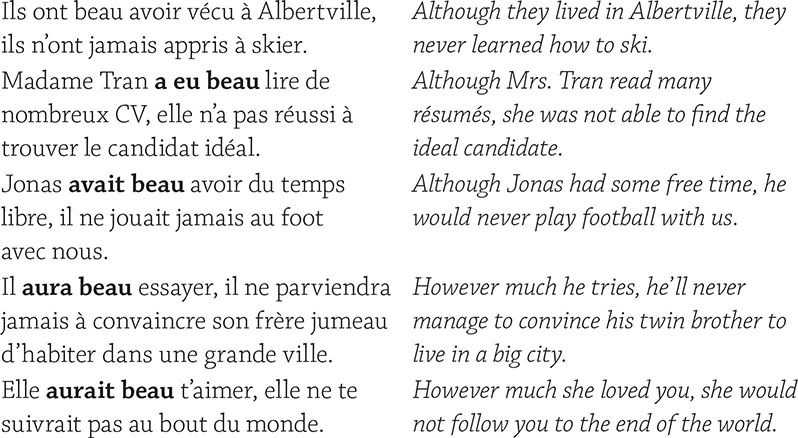
Les Pronoms Relatifs
In order to link ideas back to people and things already mentioned, the pronoms relatifs—relative pronouns—are used. Relative pronouns relate two sentences, making one dependent on the other. Choosing the correct relative pronoun depends on the pronoun’s function in the sentence (subject, direct object, or object of a preposition).
Qui
Let’s start with the relative pronoun qui used as a subject. Qui may refer to people or things and may mean who, whom, which, what, or that.

The i of qui is never dropped before a vowel sound.

The verb following qui agrees with the noun or pronoun that qui replaces.

Que
When the clause introduced by a relative pronoun already has a subject, the relative pronoun is the object of the verb of the clause it introduces. In this case, the relative pronoun que (whom, which, that) is used. Que may also refer to people and things.

The e of que is dropped before a vowel.

In the past tense, if the direct object is placed before the verb, the past participle agrees in gender and number with the object.

Relative Pronouns Followed by Prepositions
When verbs are followed by prepositions, the relative pronouns qui, quoi, lequel, laquelle, lesquels, and lesquelles are used. The preposition is placed before the relative pronoun. Qui is used to refer to people only, whereas lequel, laquelle, lesquels, and lesquelles refer mostly to things. Lequel, laquelle, lesquels, and lesquelles may also be used for people; this usage, however, is less common.

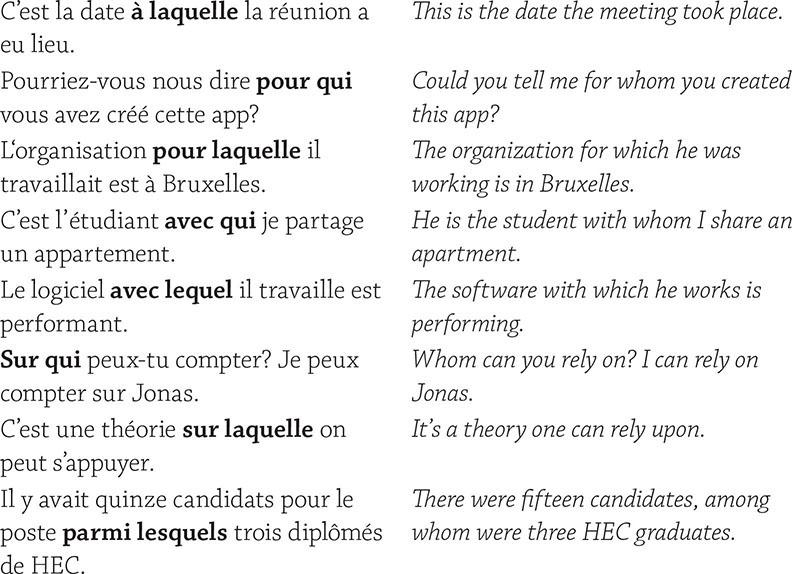
Dont
The relative pronoun dont acts as an object and can refer to people and things. It is used mostly to refer to objects of verbs or adjectives that are followed by the preposition de. You may want to review the verbs and their prepositions in Chapter 6.


Où
The relative pronoun où often replaces dans lequel, sur lequel, or par lequel.

Où is also used after expressions of time: l’instant où, le moment où, le jour où, la semaine où, l’année où, etc.

Ce que, Ce qui, Ce dont, and Ce à quoi
When there is no specific word or antecedent for the relative pronoun to refer to, the antecedent ce is added. Ce qui, ce que, ce dont, and ce à quoi, all meaning what, refer to ideas, not to persons, and do not have gender or number. Choosing the correct indefinite relative pronoun again depends on the pronoun’s function in the sentence (subject, direct object, or object of a preposition). Often, the indefinite relative pronouns, ce qui, ce que, ce à quoi, and ce dont, are placed at the beginning of a sentence to stress a point. It compensates for the English intonation that is much more marked. When a verb requires a preposition, it is repeated in the second clause.

Ce dont is used when verbs take the preposition de.

Note that de is repeated in the second clause:

Ce à quoi is used with verbs that take the preposition à. Note that à is repeated in the second clause:

Note that ce is often omitted in questions or statements like:

 DIALOGUE Décrocher un boulot chez Airbus et vivre à Toulouse Getting a job with Airbus and settling in Toulouse
DIALOGUE Décrocher un boulot chez Airbus et vivre à Toulouse Getting a job with Airbus and settling in Toulouse
Erwan Le Goff is being interviewed for a job at Airbus aerospace corporation in Toulouse by the HR director, Madame Maïka Darrieussecq. After landing the job, he tells his friend Jonas how he and many students in France have found an affordable housing solution.
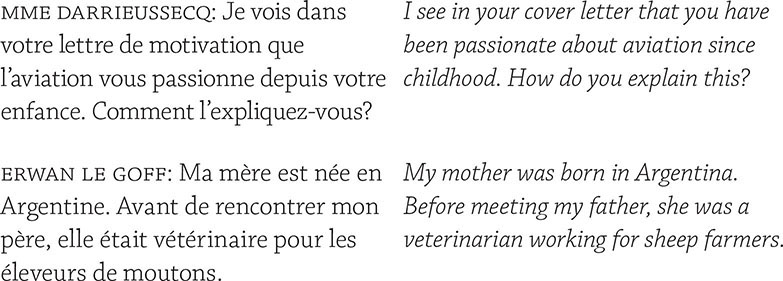
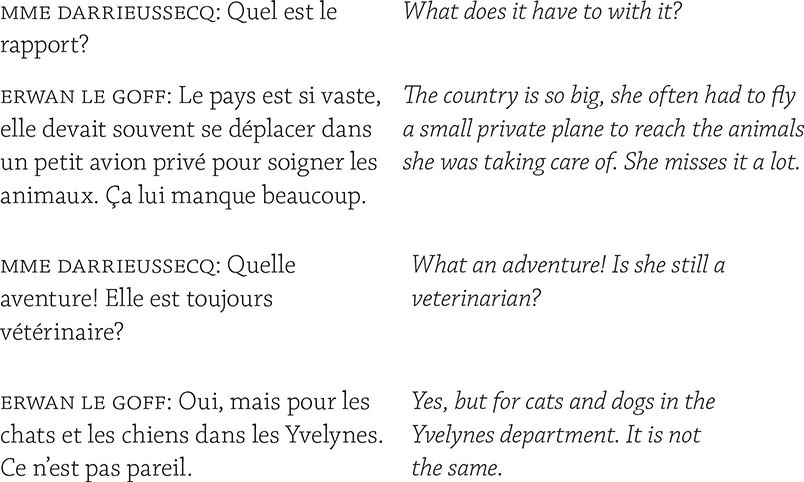
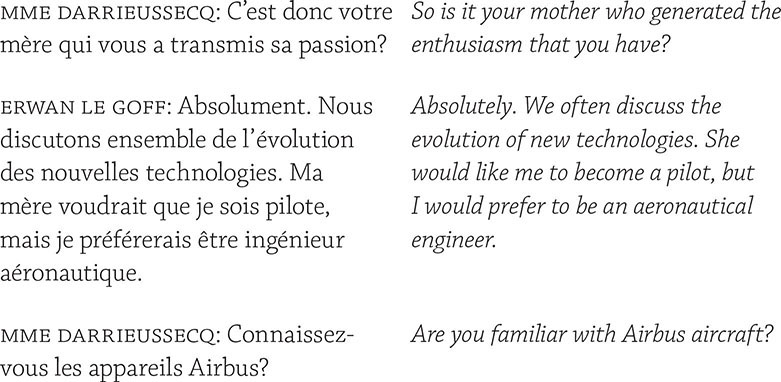

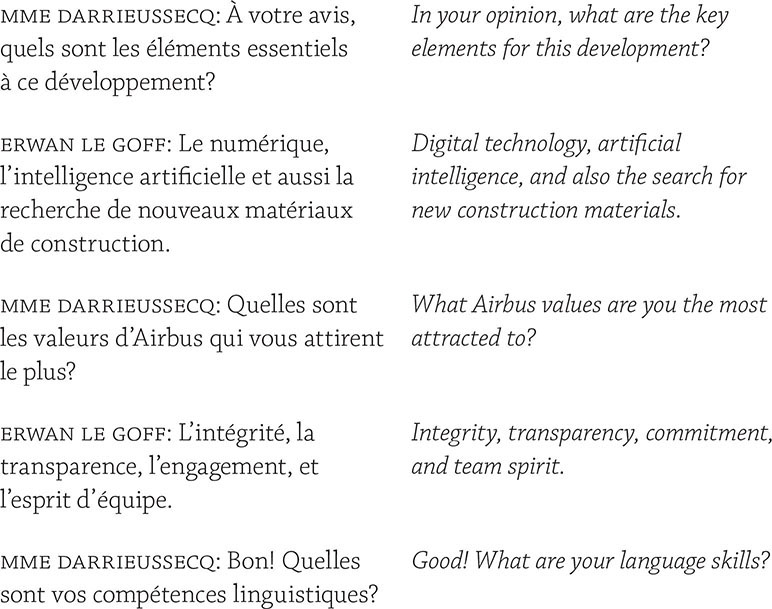
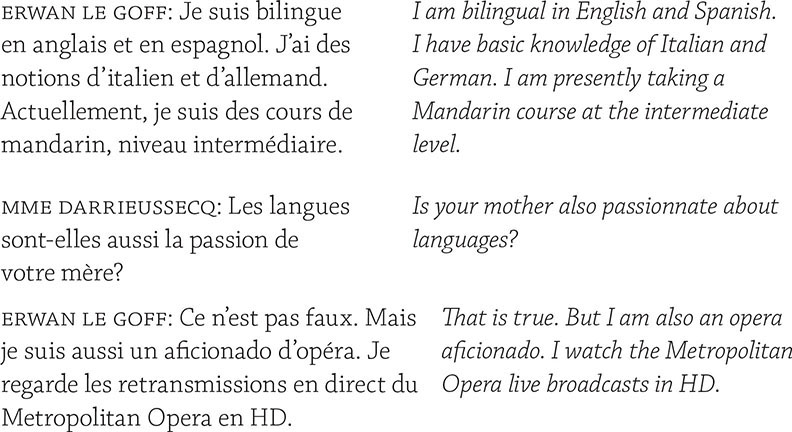
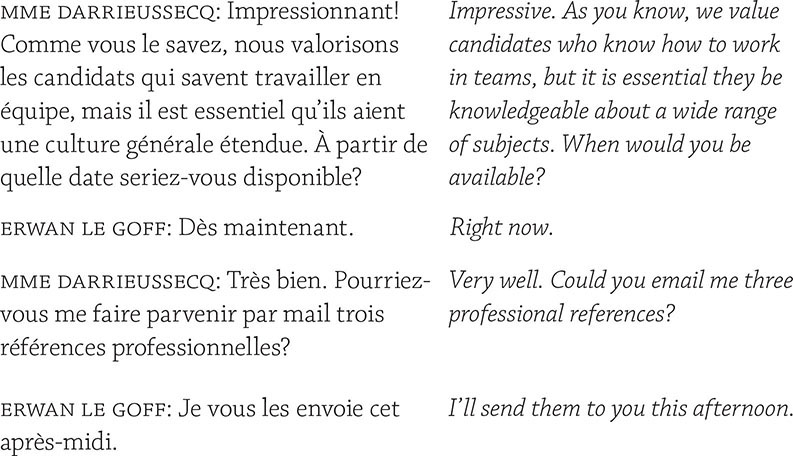

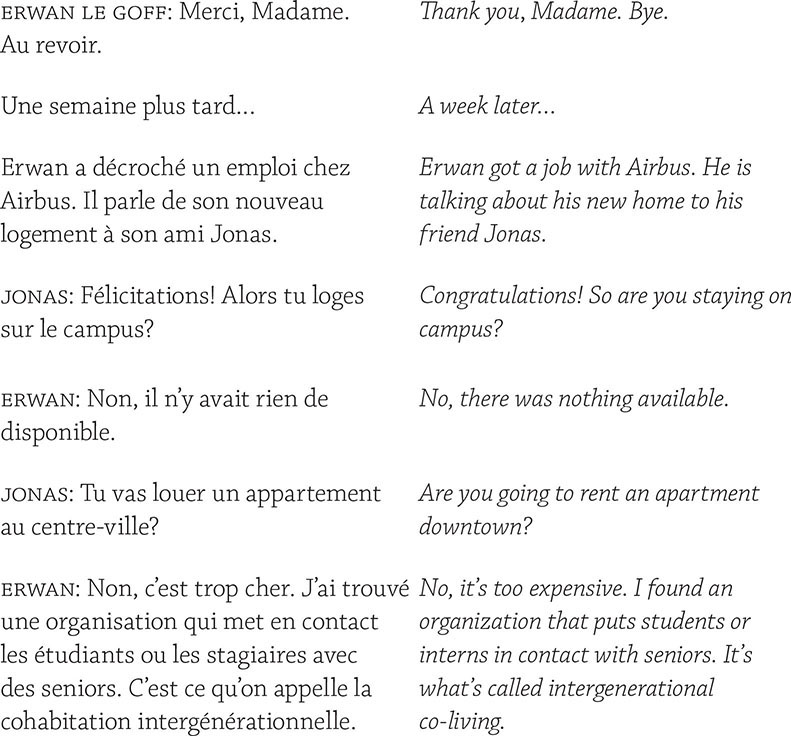
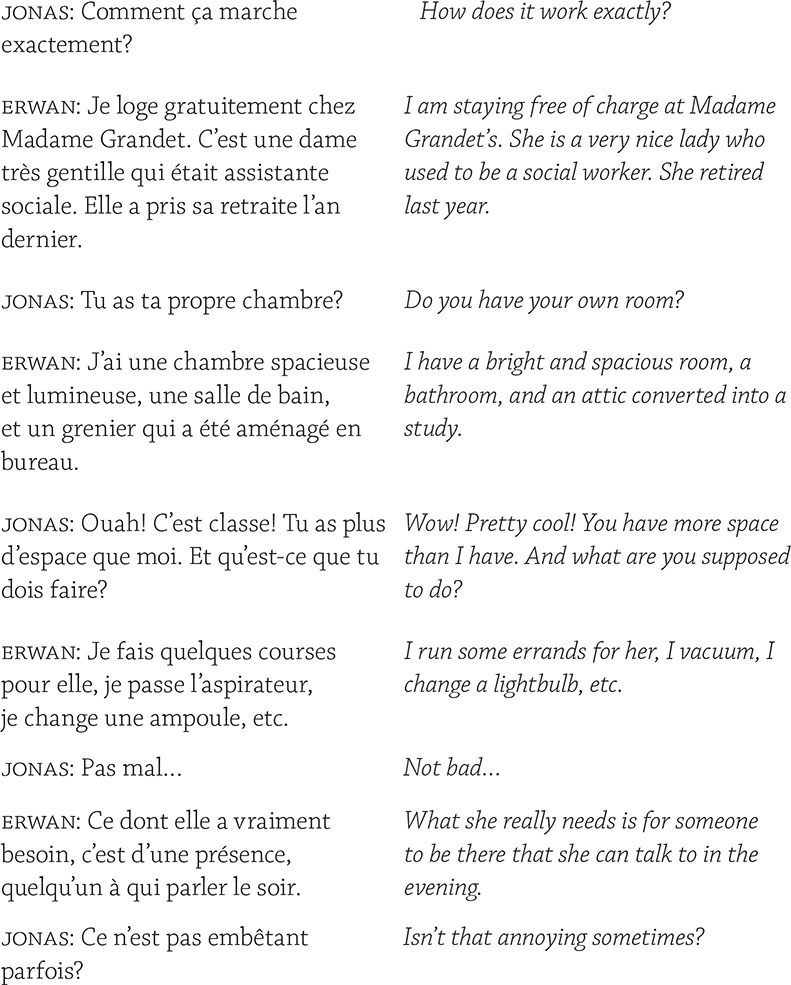
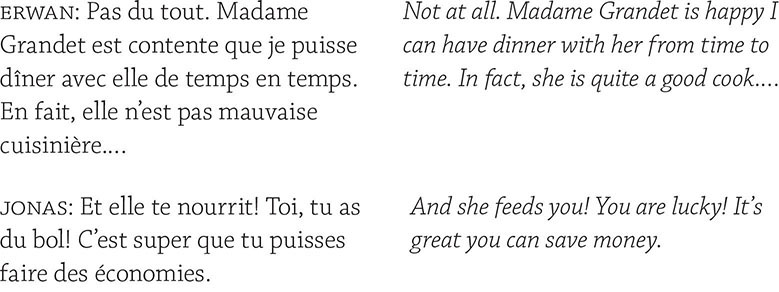
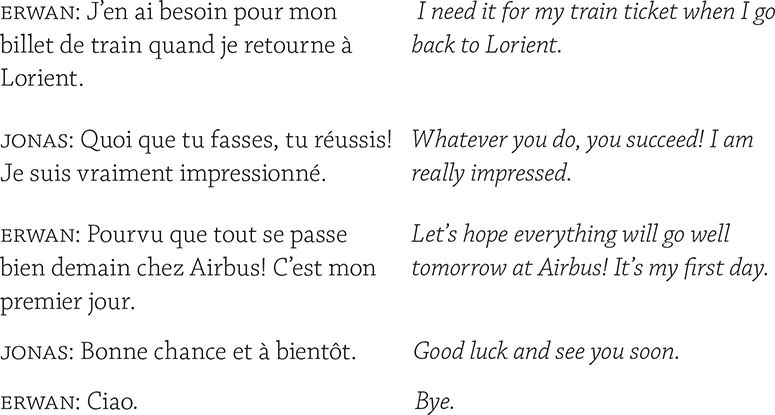
EXERCISES
EXERCISE 13.1
Conjugate the following verbs in the present subjunctive.
1. Tu (prendre) _______________.
2. Nous (savoir) _______________.
3. Vous (mettre) _______________.
4. Ils (être) _______________.
5. Elle (croire) _______________.
6. Je (avoir) _______________.
7. On (aller) _______________.
8. Tu (apprendre) _______________.
9. Elle (dire) _______________.
10. Elles (vouloir) _______________.
EXERCISE 13.2
Conjugate the following verbs in the subjonctif présent.
1. Elle est triste que tu (ne pas aller) ______ dans son université.
2. Je crains que ce (être) ______ difficile d’être accepté dans cet institut.
3. J’aimerais mieux qu’il (n’y a pas) ______ trop de travail à faire ce week-end.
4. Nous doutons qu’il (vouloir) ______ s’inscrire au Lycée Naval en Bretagne.
5. Il est content que tu (pouvoir) ______ faire de la voile pendant le week-end.
6. Vous doutez qu’elle (connaître) ______ cette école d’agronomie.
7. Elles ne croient pas que cela (correspondre) ______ à leurs besoins.
8. Je voudrais que tu (faire) ______ des photos du studio.
9. Ne croyez-vous pas que ce (être) ______ un bon choix?
10. Je ne pense pas que cela (pouvoir) ______ marcher.
EXERCISE 13.3
Conjugate each verb in the present tense of either the indicative or the subjunctive.
1. Je sais que cette formation (être) ______ très intense.
2. Nous ne sommes pas sûrs que cet appartement (avoir) ______ assez de pièces.
3. Elle a l’impression que vous (ne pas connaître) ______ ce sujet.
4. Est-ce qu’il a peur que tu (ne pas pouvoir) ______ venir ce soir?
5. Je doute que Sophie (vouloir) ______ habiter sur le campus.
6. On ne pense pas que le directeur de communication (savoir) ______ gérer cette affaire.
7. Aimeriez-vous que nous (aller) ______ à la Cité de l’espace avec vous?
8. Il croit qu’on (ne pas comprendre) ______ la situation.
9. J’exige que vous (arriver) ______ à l’heure tous les matins.
10. Elle est étonnée que nous (ne pas vouloir) ______ assister à la cérémonie.
EXERCISE 13.4
Translate the following sentences using the vous form when applicable. When asking a question, use inversion.
1. She is happy you are on her team.
2. Do you think he can drop me off at the station?
3. They are afraid that she won’t have enough time.
4. I would like them to sign up for music class.
5. The teacher demands that we hand over our homework before Monday.
6. I’m not sure that the weather will be nice tomorrow.
7. Would you like to host some foreign students?
8. I regret that there aren’t enough computers in this office.
9. We doubt that he is trying his best.
10. I am surprised that they want to collaborate with us.
EXERCISE 13.5
Conjugate the following verbs in the subjonctif présent.
1. Il étudie le mandarin quoique ce (être) ______ difficile.
2. Elles posent leur candidature en avance de peur qu’il (n’y a pas) ______ de places.
3. Les employés préparent un test sans que le directeur (être) ______ au courant.
4. Nous te soutiendrons à condition que tu (obtenir) ______ de bons résultats.
5. En attendant que je (recevoir) ______ une réponse de Madame Darrieussecq, mon frère essaie de me distraire.
6. La directrice des ressources humaines fait le grand ménage avant que nous (arriver) ______ .
7. Ses parents travaillent dur pour qu’ils (pouvoir) ______ faire des études supérieures.
8. Bien qu’il (avoir) ______ de bonnes notes, il n’a pas réussi le concours d’entrée.
9. Nous avons déplacé les meubles afin qu’ils (repeindre) ______ le studio.
10. Elle révisera sa copie jusqu’à ce que le directeur du marketing (être) ______ satisfait.
EXERCISE 13.6
Conjugate the following verbs in the subjonctif présent.
1. Il étrange que ce cours d’économie (ne pas être) ______ offert en anglais.
2. Il vaut mieux que vous (réunir) ______ tous vos documents à l’avance.
3. Il est dommage que nous (ne pas pouvoir) ______ aller à Albi ce week-end.
4. Il est possible qu’elle nous (remettre) ______ les clés du studio lundi.
5. Il est normal que vous (faire) ______ la queue à la cafétéria.
6. Il faut que les frais de scolarité (être) ______ réglés avant le premier septembre.
7. Il se peut que nous (avoir) ______ le temps d’aller faire des courses.
8. Il est naturel que vous (s’inquiéter) ______ de l’avenir de vos enfants.
9. Il est préférable que vous (suivre) ______ ces deux cours à la fois.
10. Il est rare que les élèves (passer) ______ le bac à l’âge de 15 ans.
EXERCISE 13.7
Translate the following sentences using the vous form when applicable.
1. Hugo prepared some sandwiches, fearing that we might be hungry.
2. Although he is tired, he is going to study until midnight.
3. It is normal for roommates to fight from time to time.
4. Let’s hope they make couscous tonight.
5. They are studying Mandarin before their friends from Shanghai arrive.
6. It’s the most beautiful museum I know.
7. I bought the tickets in advance so that we don’t wait in line.
8. Let’s hope we find an apartment with a nice view.
9. I am looking for a university that can host handicapped students.
10. While waiting for the problems to be resolved, we thank you for your patience.
EXERCISE 13.8
Conjugate the following verbs in the past subjunctive.
1. Je suis contente qu’elle (choisir) ______ cette profession.
2. Il doute que tu (réussir) ______ à ton examen.
3. Nous ne croyons pas qu’il (suivre) ______ nos conseils.
4. Tu ne pourras pas assister à la conférence à moins que ton professeur ne te (inscrire) ______ sur la liste.
5. Il est dommage que vous (s’inscrire) ______ trop tard.
6. Il a passé son bac avec mention bien qu’il (s’amuser) ______ toute l’année.
7. Pensez-vous qu’il (vraiment) (finir) ______ sa thèse?
8. Il vaut mieux que tu (ne pas perdre) ______ ton dossier.
9. On est content que tu (trouver) ______ un appartement.
10. Il est possible qu’ils (se tromper) ______ d’adresse.
EXERCISE 13.9
Translate the following sentences using the vous form and the inversion if necessary.
1. I am surprised you refused their offer.
2. They are sorry you were not able to open a bakery in their neighborhood.
3. Do you think artificial intelligence has already transformed our lives?
4. We regret you did not send a cover letter.
5. It is possible François lost his wallet.
6. It is a shame you did not get an apartment on campus.
7. Do you really think his mother had bought a private plane?
8. I doubt they read this novel by André Gide.
9. I don’t think he sent his résumé to the right address.
10. We are happy he finally told the truth.
EXERCISE 13.10
Translate the following sentences using the tu form when necessary.
1. Whatever your decision, I’ll accept it.
2. Wherever you go, Erwan will help you.
3. Whatever the price of the rent, we want to live downtown.
4. Whatever you do, don’t forget your friend Jonas.
5. Wherever the farm is located, Madame Le Goff will take care of the sheep.
6. Whatever your language skills, they’ll hire you.
7. Whatever may happen, be careful.
8. Whatever the students’ age, Madame Grandet rents them a room.
9. Whatever you think, I don’t care.
10. Whatever your dreams may be, follow them.
EXERCISE 13.11
Replace the conjunction quoique by the avoir beau construction. Careful when choosing the tense.
Quoiqu’il soit riche, il est radin. → Il a beau être riche, il est radin.
1. Quoiqu’il vive au Brésil depuis trois ans, il ne parle pas portugais.
2. Quoiqu’elle ait vécu à Nice pendant des années, elle n’a jamais appris à nager.
3. Quoiqu’elle cherche, elle ne trouve pas sa carte d’identité.
4. Quoiqu’il ait toujours fui son identité, ses racines lui collaient à la peau.
5. Quoiqu’il passe des annonces, il ne trouve pas de logement.
6. Quoiqu’elle ait gagné le prix Goncourt, elle n’a pas la grosse tête.
7. Quoique tu aies dit la vérité, ils n’ont rien voulu entendre.
8. Quoique Madame Grandet ait pris sa retraite, elle est toujours occupée.
9. Quoiqu’il ait étudié le wolof, il ne le parle pas couramment.
10. Quoiqu’ils vivent à la campagne, ils n’ont pas d’animaux de compagnie.
EXERCISE 13.12
Complete with the appropriate pronom relatif.
1. Le studio ______ il veut louer est spacieux.
2. Le quartier______ nous plaît est le quartier Côte-Pavée.
3. C’est un écrivain ______ je connais bien. Je vous le recommande vivement.
4. Pour ______ préférez-vous travailler? Pour M. Jeannot ou Mme Hidalgo?
5. Les ustensiles ______ le chef a besoin sont dans ce placard.
6. L’entreprise pour ______ il travaille va fermer ses portes.
7. Le stylo avec ______ Madame Darrieussecq signe le contrat est un stylo-plume Montblanc.
8. La photo ______ ai besoin se trouve dans les archives d’Alger.
9. Chez ______ dînez-vous demain soir?
10. Le directeur de communication ______ j’ai rencontré s’appelle Monsieur Ferrand.
11. C’est la maison ______ Victor Hugo a écrit Les Misérables quand il était en exil à Guernesey.
12. Êtes-vous sûr de savoir ______ il est?
13. J’ignore pour ______ Madame Grandet a voté aux élections européennes.
14. Les histoires ______ je me souviens remontent aux années 2000.
15. Dès le jour ______ nous avons commencé, je savais que ça marcherait.
EXERCISE 13.13
Match the items in the two columns. Choose very carefully the most logical answers!
EXERCISE 13.14
Complete with the appropriate indefinite pronoun.
1. ______ je pense, c’est à mon entretien chez Hermès.
2. ______ Nicolas s’attend, c’est à une augmentation de salaire.
3. Je ne comprends pas ______ ils veulent dire.
4. ______ je m’intéresse, c’est à votre expérience à la Madeleine avec Massimo Bottura.
5. ______ elle a envie, c’est de faire Sciences Po.
6. Pourrais-tu me dire ______ se passe?
7. ______ lui plaît, c’est le grenier aménagé chez Madame Grandet.
8. ______ il a peur, c’est de la fermeture de l’entreprise.
9. Pour faciliter notre enquête sur le vol, nous voudrions savoir tout ______ vous vous souvenez.
10. C’est ______ on appelle la cohabitation intergénérationnelle!
EXERCISE 13.15
Translate the following sentences using the vous form when necessary.
1. I like the studio Jonas found in Toulouse.
2. Madame Bessis? I don’t know who she is.
3. The manual she is talking about is written in English.
4. What I need is a dictionary.
5. What she is interested in is the new Airbus.
6. What are you talking about?
7. —What are you thinking about? —I am thinking about Lorient’s festival.
8. What I remember is her Montblanc fountain pen on her desk.
9. What we want is more free time.
10. It’s the piece of furniture she wants to take to Menton.

LE COIN DES CRÉATEURS
ÉCRIRE L’ÉBAUCHE D’UNE LETTRE DE MOTIVATION
Vous répondez à une annonce dans le journal qui recrute un vendeur/une vendeuse ou un serveur/une serveuse ou autre emploi pour les mois de juillet et août. Vous devez convaincre le responsable qui cherche le ou la candidat(e) idéal(e). Faire une liste de:
■ vos qualités humaines
■ vos compétences
■ vos expériences
■ vos passions
■ votre raison de vouloir travailler pour eux
■ vos disponibilités
Quelques pistes pour vous aider: je suis sociable et souriante; je connais bien vos produits; je suis très organisée; je parle trois langues; j’ai fait un stage l’an passé. Rédigez au moins dix arguments en puisant dans le vocabulaire des chapitres précédents.
À votre tour!
NOTE CULTURELLE
MADE IN FRANCE: THE FRENCH ECONOMY
When we think of “Made in France,” a variety of consumable products come to mind: baguettes and brioches, pastries and macarons, champagne and cognac, Camembert and Roquefort. Or we may think of other consumer goods: couture and prêt-à-porter fashion, fine jewelry and watches or other luxury goods. While they all represent a considerable source of income for France, the country’s economy is actually much more diverse. It is the seventh largest in the world and the third largest of the Eurozone countries based on gross domestic product (GDP). Services rather than goods are the main contributor to the country’s economy, with over 70 percent of GDP stemming from this sector. So what are some of the key players in the French economy? The country’s top companies are:
■ Total – oil extraction and natural gas mining, transport, distribution, and marketing
■ AXA – insurance
■ BNP Paribas – banking
■ Engie, aka GDF Suez – electricity generation, natural gas, and renewable energy
■ Carrefour – hypermarket superstores and supermarkets
■ Crédit Agricole – banking
■ Société Générale – banking
■ Éléctricité de France – electrical energy distribution
■ Groupe PSA (Peugeot Société Anonyme) – automotive
■ Groupe BPCE – banking
France’s closest trading partner is Germany, which accounts for more than 17 percent of France’s exports. Its primary exports are machinery and transportation equipment, aircraft and spacecraft, vehicles, electronic equipment, and pharmaceuticals. What French companies account for the most exports? The top exporting companies are:
■ Total – oil and gas
■ Renault – automotive
■ Sanofi – pharmaceuticals
■ Christian Dior – clothing and accessories
■ Peugeot – automotive
■ Danone – processed food and beverages
■ Saint-Gobain – construction materials
■ Schneider Electric – electrical equipment
■ L’Oréal Group – household, personal care
■ Hermès International – clothing and accessories
France is also one of the world’s largest exporters of farm and agricultural products. And then there is tourism, a key export since France is the most visited country in the world. It is truly a major economic player on the world stage. So exactly where does it stand? The world’s largest economies are:
■ United States
■ China
■ Japan
■ Germany
■ United Kingdom
■ India
■ France
■ Italy
■ Brazil
■ Canada
 KNOW
KNOW Wishing for something? Use pourvu que.
Wishing for something? Use pourvu que.

